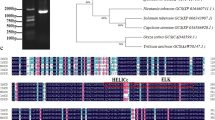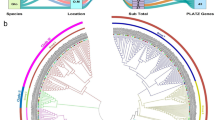Abstract
The pentose phosphate pathway (PPP) is the important metabolism pathway in plant. In the present study, a cDNA encoding one of the key enzymes of PPP, 6-phosphogluconate dehydrogenase(6PGDH), was isolated from rice and designated as Os6PGDH. The Os6PGDH encoding protein is a cytosolic isoenzyme according to the absence of plastid transit peptide at the N-terminus. The full-length cDNA of 1751 bp encodes 480 amino acids and its putative protein sequence is 94%, 84% and 83% identical to maize, spinach and alfalfa 6PGDHs respectively. Comparison of the cloned mRNA sequence with that of the genomic sequence from the Rice Genome Project showed a simple genomic organization devoid of introns in the translated region of the gene. RT-PCR experiments revealed that Os6PGDH expression was high in inflorescence, low in root and embryos but almost absent in leaves. Furthermore, Os6PGDH was up-regulated in the shoots under salt stress. It is suggested that 6PGDH in plant may play an important role in cell division and salt response.
Similar content being viewed by others
References
Dennis DT, Huang Y & Negm FB (1997) In: Dennis D, Turpin DH, Lefebvre DD, Layzell DB (eds) Plant metabolism. Pp 69–80, Longman, Harlow, UK
Herbert M, Burkhard CH & Shnarrenberger C (1979) Planta 145: 95–104
Huang J, Wang JF, Zhang HS, Cao YJ, Lin CF, Wang D & Yang JS (2002) Acta Genetica Sinica 29: 1012–1016
Nemoto Y & Sasakuma T (2000) Plant Sci. 158: 53–60
Fahrendorf T, Ni W, Shorrosh BS & Dixon RA (1995) Plant Mol. Biol. 28: 885–900
Redinbaugh MG & Campbell WH (1998) Plant Sci. 134: 129–140
Karsten K, Marlies P & William M (2001) Eur. J Biochem. 268: 2678–2686
van Assche F, Cardinaels C & Clijsters H (1988) Environ. Pollut. 52: 103–115
McElroy D, Rothenberg M & Wu R (1990) Plant Mol. Biol. 14: 163–171
Kozak M (1987) Nucl. Acid Res. 15: 5125–8148
Choi H, Hong J, Ha J, Kang J & Kim SY (2000) J Biol. Chem. 275: 1723–1730
Eulgem T, Rushton PJ, Schmeizer E, Hahlbrock, K & Somssich IE (1999) EMBO J 18: 4689–4699
Siberil Y, Doireau P & Gantet P (2001) Eur. J Biochem. 268: 5655–5666
Quandt K, Frech K, Karas H, Wingender E & Werner T (1995) Nucleic Acids Res. 23: 4878–4884
Heinemeyer T, Chen X, Karas H, Kel AE, Kel OV, Liebich I, Meinhardt T, Reuter I, Schacherer F & Wingender E (1999) Nucleic Acids Res. 27: 318–322
Sindelar L, Sindelarova M & Burketova L (1999) Plant Physiol. Biochem. 37: 195–201
Louise EA, Toh-Chin LN & Kyung-Eun P (1974) Plant Physiol. 53: 835–839
Author information
Authors and Affiliations
Rights and permissions
About this article
Cite this article
Huang, J., Zhang, H., Wang, J. et al. Molecular cloning and characterization of rice 6-phosphogluconate dehydrogenase gene that is up-regulated by salt stressa . Mol Biol Rep 30, 223–227 (2003). https://doi.org/10.1023/A:1026392422995
Issue Date:
DOI: https://doi.org/10.1023/A:1026392422995




